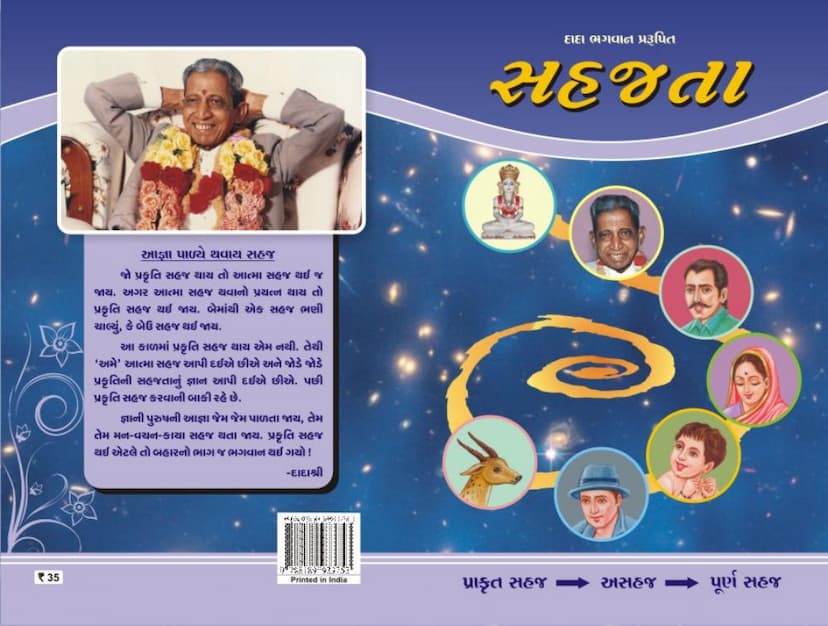Sahajta
Added to library: September 2, 2025

Summary
The Jain text "Sahajta" (Simplicity/Naturalness), authored by Dada Bhagwan and published by Mahavideh Foundation, explores the concept of attaining a state of naturalness and ease, both in one's spiritual inner self (Atma) and in one's outer manifestation (Prakriti).
The core message of the book is that true spiritual liberation (Moksha) is the attainment of a state of naturalness. This state can be achieved through two interconnected paths: either by making one's nature (Prakriti) natural, which in turn makes the Self (Atma) natural, or by making the Self natural, which then makes the nature natural. Dada Bhagwan emphasizes that in the current era (Kaal), it is difficult to make one's external nature natural. Therefore, the Akram (non-step-by-step) path offered by him focuses on directly imparting the natural state of the Self and simultaneously providing knowledge for making the nature natural.
Key Concepts and Themes:
- The Natural State of the Self (Atma): The Soul is inherently pure and natural. The un-naturalness arises from ignorance (Agnan).
- The Unnaturalness of Nature (Prakriti): The external nature, including mind, speech, and body, becomes unnatural due to ignorance, leading to attachment and aversion (Raga-Dvesha), anger, pride, deceit, and greed (Krodha-Mana-Maya-Lobha), and ultimately the ego.
- The Akram Path: Dada Bhagwan's unique path offers a shortcut. Through a spiritual Gnan Vidhi (self-realization ceremony), one is directly given the experience of the pure Self. This is described as a "lift" compared to the "stairs" of the gradual path.
- Following the Commands (Aagna): The five commands provided by Dada Bhagwan are the tools to gradually align one's nature with the natural state of the Self. By adhering to these commands, one's inner interference in natural processes ceases, leading to the naturalness of Prakriti.
- The Role of Ignorance (Agnan) and Knowledge (Gnan): Ignorance causes the ego to act as a doer and enjoyer, creating unnaturalness. Knowledge dispels ignorance, allowing the Self to remain as a knower-seer (Gnata-Drashta), independent of the actions of the body and mind.
- Distinguishing Naturalness: The book differentiates between two types of naturalness:
- Prākrut Sahaj (Natural naturalness): This is the state of animals, children, or undeveloped beings, who are natural due to a lack of fully developed ego and desires. It is a natural state stemming from ignorance.
- Pragya Sahaj (Naturalness born of wisdom): This is the spiritual naturalness attained through self-knowledge, where one remains a pure, unaffected Self, observing all actions of the body and mind without egoistic interference. This is the ultimate goal.
- The True Doer: The ego ("I am Chandubhai") is the cause of unnaturalness and the binding of new karma. The true Self (Shuddhātma) is the knower and witness, not the doer. Understanding that "Chandubhai" acts and the Self merely witnesses is crucial.
- The Importance of Seeing, Not Interfering: The key to naturalness is to witness the unfolding of events and actions without interference, attachment, or aversion. Trying to control or change things creates unnaturalness.
- The Role of the Five Commands: These are presented as the essence of all scriptures, designed to help one break free from the cycle of unnaturalness caused by ego and attachment.
- The Ultimate Goal: The ultimate goal is to reach a state of complete naturalness, where both the Self and the body act in their natural states, free from the ego and its interferences. This leads to a state of perpetual bliss and liberation.
- The Role of Divine Grace and Guidance: The teachings are presented as a direct transmission of divine knowledge and grace, enabling rapid spiritual progress. The book highlights the lineage of teachers, including Dada Bhagwan, Niruma, and Deepakbhai, who facilitate this process.
In essence, "Sahajta" is a guide to understanding and living in accordance with one's inherent pure and natural state of the Self, by dissolving the ego and its associated unnatural tendencies through self-knowledge and adherence to the divine commands. It is a path of effortless living, where one remains a detached observer of all that unfolds, thus attaining true peace and liberation.